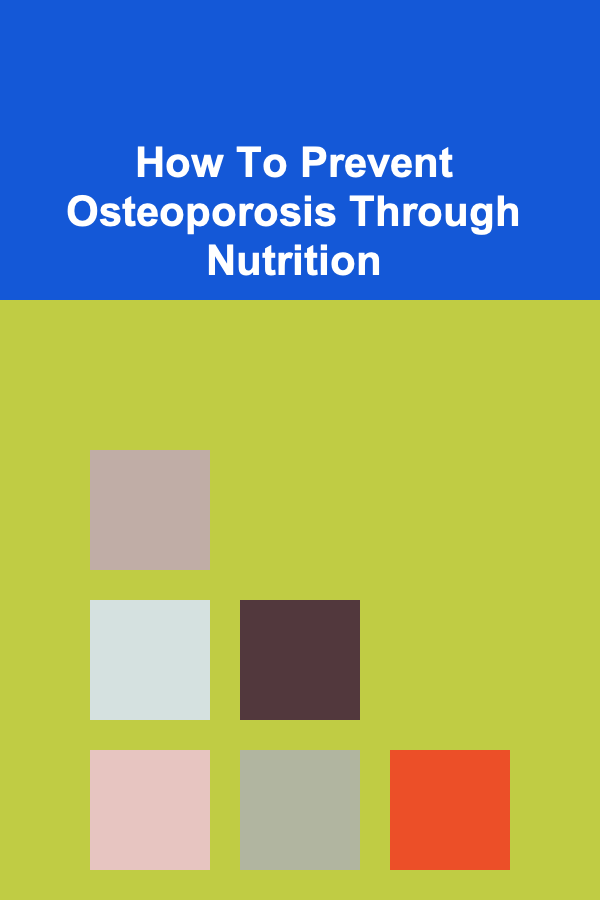
How To Prevent Osteoporosis Through Nutrition
ebook include PDF & Audio bundle (Micro Guide)
$12.99$11.99
Limited Time Offer! Order within the next:

Osteoporosis is a common yet serious condition that affects millions of individuals worldwide, particularly the elderly. It is characterized by the weakening of bones, making them more prone to fractures. While osteoporosis is often associated with aging, the process of bone loss can begin much earlier in life. Preventing osteoporosis is not only about managing it after it develops; it's also about understanding how lifestyle choices, particularly nutrition, play a key role in maintaining bone health throughout life.
In this article, we will explore the ways in which proper nutrition can help prevent osteoporosis. We'll look at the key nutrients involved in bone health, foods that promote strong bones, and lifestyle choices that can support bone density. The aim is to provide a comprehensive guide for individuals of all ages to help prevent osteoporosis through a balanced and nutrient-rich diet.
Understanding Osteoporosis
Osteoporosis is a disease in which bones become brittle and fragile from loss of tissue. This loss occurs when the formation of new bone cannot keep up with the loss of old bone. It often progresses without noticeable symptoms, and many people may not know they have it until they experience a bone fracture. The condition primarily affects the spine, hips, and wrists, but any bone in the body can be vulnerable.
Key factors that contribute to osteoporosis include:
- Age: Bone mass naturally peaks around the age of 30, and after that, bone density begins to decline.
- Gender: Women are at a higher risk due to hormonal changes during menopause.
- Genetics: Family history can play a role in the development of osteoporosis.
- Lifestyle factors: Diet, physical activity, and smoking or alcohol consumption can all influence bone health.
While some risk factors like age and genetics cannot be controlled, nutrition plays an essential role in bone health and osteoporosis prevention. By ensuring that the body has the right nutrients, individuals can maintain strong bones and reduce the risk of bone loss.
Essential Nutrients for Bone Health
Several nutrients are particularly important for maintaining bone strength and density. These include calcium, vitamin D, protein, magnesium, vitamin K, and phosphorus. Let's explore how each of these nutrients supports bone health and the best sources of each.
1. Calcium
Calcium is perhaps the most well-known nutrient when it comes to bone health. It is the primary mineral that makes up bone structure, providing bones with their strength and rigidity. Without adequate calcium, bones become weaker and more prone to fractures.
Recommended Daily Intake:
- Adults (19-50 years): 1,000 mg per day
- Women over 50 and men over 70: 1,200 mg per day
Sources of Calcium:
- Dairy products: Milk, cheese, and yogurt are excellent sources.
- Leafy green vegetables: Kale, bok choy, and broccoli are calcium-rich.
- Fortified foods: Some plant-based milks (soy, almond, etc.), cereals, and orange juice are fortified with calcium.
- Fish: Sardines and salmon (with bones) provide a significant amount of calcium.
2. Vitamin D
Vitamin D plays a critical role in bone health by enhancing calcium absorption in the gut. Without sufficient vitamin D, the body cannot effectively absorb calcium, which can lead to weakened bones and increased risk of fractures.
Recommended Daily Intake:
- Adults (19-70 years): 600 IU per day
- Adults over 70 years: 800 IU per day
Sources of Vitamin D:
- Sunlight: The body produces vitamin D when the skin is exposed to sunlight. Just 10 to 15 minutes of sun exposure several times a week can help maintain adequate levels.
- Fatty fish: Salmon, mackerel, and sardines are excellent sources.
- Fortified foods: Many dairy products, plant-based milks, and breakfast cereals are fortified with vitamin D.
- Egg yolks and beef liver: These also contain small amounts of vitamin D.
3. Protein
Protein is a building block for bones, as it helps in the formation of collagen, the structural protein that forms the bone matrix. Adequate protein intake helps maintain bone density and strength. A deficiency in protein can lead to bone loss and fractures.
Recommended Daily Intake:
- Adults: 46-56 grams of protein per day, depending on age, sex, and physical activity level.
Sources of Protein:
- Lean meats: Chicken, turkey, and lean cuts of beef and pork.
- Plant-based proteins: Beans, lentils, tofu, and quinoa.
- Dairy products: Milk, yogurt, and cheese are great protein sources.
- Eggs and fish: Both are rich in protein and can be included in a bone-healthy diet.
4. Magnesium
Magnesium is another essential mineral for bone health. It helps convert vitamin D into its active form, which is crucial for calcium absorption. Magnesium also plays a role in bone mineralization and strength.
Recommended Daily Intake:
- Women (19-30 years): 310 mg
- Men (19-30 years): 400 mg
Sources of Magnesium:
- Leafy green vegetables: Spinach and Swiss chard are high in magnesium.
- Nuts and seeds: Almonds, cashews, sunflower seeds, and pumpkin seeds are excellent sources.
- Whole grains: Brown rice, oats, and barley contain magnesium.
- Legumes: Beans, lentils, and chickpeas also provide magnesium.
5. Vitamin K
Vitamin K is important for bone health because it helps regulate calcium in the bones. It is involved in the synthesis of osteocalcin, a protein that binds calcium to bone. Adequate vitamin K levels ensure that calcium is deposited in bones rather than in soft tissues.
Recommended Daily Intake:
- Adults (19 years and older): 90-120 mcg per day
Sources of Vitamin K:
- Leafy green vegetables: Kale, spinach, and collard greens are packed with vitamin K.
- Cruciferous vegetables: Broccoli and Brussels sprouts also provide good amounts of vitamin K.
- Fermented foods: Natto (fermented soybeans) is an excellent source.
- Certain fruits: Avocados and kiwis contain moderate amounts of vitamin K.
6. Phosphorus
Phosphorus is a mineral that works closely with calcium to build strong bones and teeth. About 85% of the body's phosphorus is stored in the bones and teeth, where it supports their structure and strength.
Recommended Daily Intake:
- Adults: 700 mg per day
Sources of Phosphorus:
- Dairy products: Milk, cheese, and yogurt are rich in phosphorus.
- Meat and poultry: Chicken, turkey, and beef contain significant amounts of phosphorus.
- Nuts and seeds: Sunflower seeds and almonds are good sources.
- Whole grains: Oats, wheat, and quinoa provide phosphorus.
Foods and Meals to Promote Bone Health
Now that we've covered the essential nutrients, let's look at some bone-healthy meals and snacks that include these vital nutrients.
Breakfast Ideas:
- Fortified Oatmeal: Oats cooked with fortified soy milk, topped with almonds, chia seeds, and a drizzle of honey. This breakfast is rich in calcium, vitamin D, magnesium, and protein.
- Scrambled Eggs with Spinach: Scrambled eggs with spinach, served with a side of whole-grain toast. This meal provides protein, vitamin K, and magnesium.
Lunch Ideas:
- Grilled Salmon Salad: A salad made with leafy greens like kale or spinach, grilled salmon, avocado, and a lemon dressing. This meal is high in vitamin D, omega-3 fatty acids, calcium, and magnesium.
- Quinoa and Bean Bowl: Quinoa topped with black beans, roasted vegetables, and a sprinkle of cheese. This meal provides plant-based protein, calcium, and magnesium.
Dinner Ideas:
- Chicken Stir-Fry: Stir-fried chicken with broccoli, bell peppers, and other vegetables. Serve with brown rice for a bone-healthy, protein-packed dinner.
- Baked Sweet Potato and Salmon: Baked sweet potato with a side of salmon and steamed green vegetables like broccoli. A great combination of protein, vitamin D, and other minerals for bone health.
Snacks:
- Yogurt with Walnuts and Berries: A delicious snack that provides protein, calcium, magnesium, and antioxidants.
- Nuts and Seeds: A handful of almonds, sunflower seeds, or pumpkin seeds, which are high in magnesium and phosphorus.
Lifestyle Tips to Support Bone Health
In addition to eating a balanced diet, several lifestyle factors can help prevent osteoporosis:
1. Exercise Regularly
Weight-bearing and resistance exercises like walking, running, and strength training help maintain bone density. Regular physical activity stimulates bone remodeling, encouraging the body to produce new bone tissue.
2. Avoid Smoking and Excessive Alcohol
Smoking and excessive alcohol consumption can increase bone loss and decrease bone strength. It's important to limit alcohol intake and avoid smoking to protect bone health.
3. Maintain a Healthy Weight
Being overweight can put unnecessary stress on your bones, particularly the hips and spine. On the other hand, being underweight can lead to bone loss due to insufficient nutrient intake.
4. Ensure Sun Exposure
Vitamin D is produced by the body when the skin is exposed to sunlight. Make sure to get moderate sun exposure for vitamin D synthesis, but always remember to protect your skin from harmful UV rays.
Conclusion
Preventing osteoporosis begins with understanding the vital role nutrition plays in maintaining bone health. By ensuring that the body gets enough calcium, vitamin D, protein, magnesium, vitamin K, and phosphorus, individuals can help build and maintain strong bones throughout their life. Additionally, a healthy lifestyle that includes regular exercise and the avoidance of smoking and excessive alcohol consumption can significantly reduce the risk of developing osteoporosis.
Start today by incorporating these bone-healthy foods into your meals and adopting healthy habits that support your bone health. By taking proactive steps, you can reduce your risk of osteoporosis and enjoy stronger, healthier bones as you age.

How to Create an Accessible Seasonal Clothing Rotation
Read More
How to Maintain Your Home's Basement to Prevent Flooding
Read More
How to Make Money Online as a Pet Sitter: 10 Actionable Ideas
Read More
How to Press Flowers with Books: A Beginner's Guide
Read More
How to Color Geometric Patterns with Markers
Read More
How to Coach a New Scrum Team to Success
Read MoreOther Products

How to Create an Accessible Seasonal Clothing Rotation
Read More
How to Maintain Your Home's Basement to Prevent Flooding
Read More
How to Make Money Online as a Pet Sitter: 10 Actionable Ideas
Read More
How to Press Flowers with Books: A Beginner's Guide
Read More
How to Color Geometric Patterns with Markers
Read More